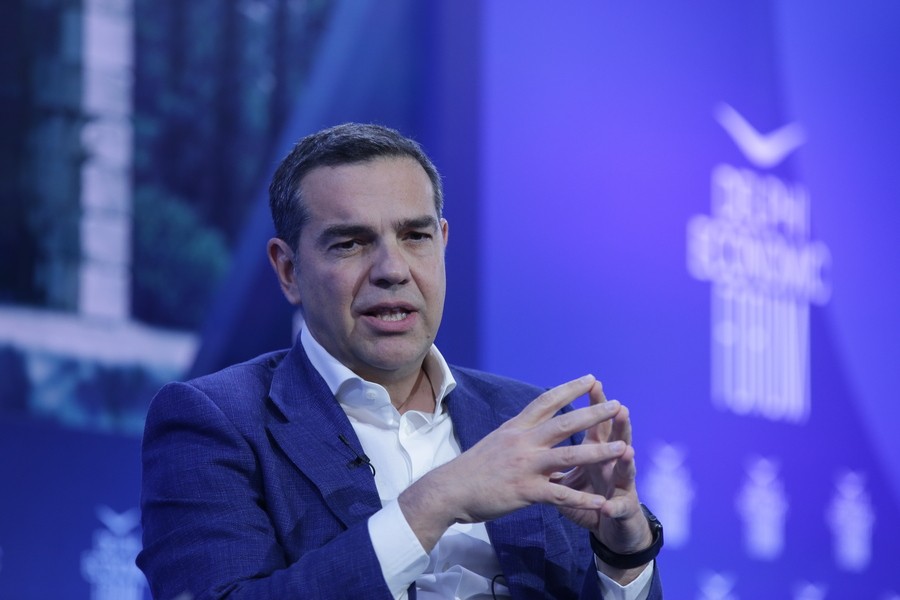
Alexis Tsipras: A Fresh, New Air in Europe?
In claiming a huge victory for his radical left-wing Syriza party on January 25th, Alexis Tsipras was able to provoke a stunning response from the Greek electorate to his country’s economic collapse that continued unabated through five long years of austerity.
The new Prime Minister sent shockwaves into the heart of Europe as he declared to both the President of the European Parliament, Martin Schulz, and to the Eurogroup Chairman, Jeroen Dijsselbloem, that he would not be backtracking on election commitments and that he intended to put an end to the humanitarian crisis in Greece.
Tsipras’ new Finance Minister, the totally hip, anti-establishment Yanis Varoufakis, rejecting all manner of formal attire in favor of a dapper overcoat and open shirt, quickly proceeded to jet from European capital to capital to make it clear that Greece was no longer willing to accept the technocrats of the “troika” as arbiters of the country’s progress under the terms of the so-called “memorandum” that had been signed by the preceding government.
The new administration’s aim being to directly converse with its partners in the EU and to seek a new deal concerning the repayment of Greece’s debt in a manner that would enable growth to return to the country. Prime Minister Tsipras assured all concerned that Greece intended to repay its loan obligations but under conditions that would be more in tune with its economic development and with the plight of its destitute citizens in mind.
Of course, Germany’s Chancellor, Angela Merkel, by way of her Finance Minister, Wolfgang Schaeuble, threatened that if Greece refused to receive the troika to assess the country’s progress it would no longer be able to benefit from the European Central Bank’s emergency support mechanisms after the agreement’s expiration at the end of February, providing a risk that the country could end up broke, with nowhere to turn to and with an abyss opened beneath her feet.
However, such a prospect would not only be frightening but far from being in the best interests of the Western world as a whole. For the President of the United States, Barack Obama, in an interview on CNN, came close to making a dramatic intervention in European internal affairs by openly urging a cessation of austerity in Greece and calling for development in the long-suffering country:
“You cannot keep on squeezing countries that are in the midst of depression,” he replied, when Fareed Zakaria asked him about Greece. “At some point, there has to be a growth strategy in order to pay off their debts and eliminate some of their deficits.”
“There is no doubt that the economy of Greece was in dire need of reform, tax collection was famously terrible and, in order for Greece to compete in the world markets, they had to initiate a series of changes.”
However, the U.S. president underlined that it is very difficult to carry out reforms when a country’s economy has contracted dramatically and Greece saw almost a quarter of its GDP disappear between 2008 and 2014.
It’s very hard to initiate those changes if people’s standards of living are dropping by 25 percent. Over time, the political system and society cannot sustain it… My hope is that Greece will remain in the Eurozone… I think that will require compromise on all sides. When the financial crisis in Greece flared up a few years ago, we were very active in trying to arrive at some sort of accommodation. I think there’s recognition on the part of Germany and others that it would be better for Greece to stay in the Eurozone than be outside of it and the markets will obviously be skittish about this.
At the same time, almost all the voices in Europe and in the American and Canadian media have been harshly judging Germany for the austerity measures that have brought Greece to the brink and have stalled development in the European Union in general, leading many member nations into recession. Almost all analysts aspire to the new Greek idea of overturning a situation that can not continue any longer and they hope that Syriza can begin to turn the page, not only in Greece, but in the entire Eurozone.
Alexis Tsipras, its young, brash and charming leader, has a momentum not only inside his country but also outside of it as he is seen as a link to a potential for better days ahead for the people of Greece and the EU as a whole.
To succeed, however, he should seek to put a halt to the different voices inside his party so that he can become a credible interlocutor with the EU and the IMF. For Tsipras can not request facilities for Greece’s debt repayments from its lenders while his Ministers announce massive hirings in the public sector and, this, without even having produced a budget as of yet. Likewise, he can not ask for the renegotiation of loan agreements that encompass reforms while his officials call for the suspension of long agreed and planned privatizations.
Alexis Tsipras has the opportunity to bring hope to his country and to Europe, as long as he doesn’t fall victim to his dogmatic colleagues who are steeped in their populist policies!

